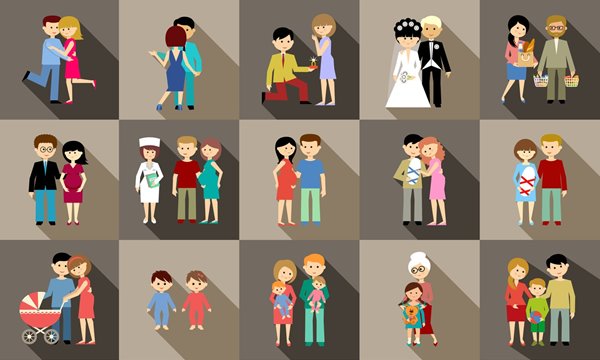February 21, 2018
By Phyllis Rittner
As a mental health advocate, I’ve listened to many brave souls share their stories about living with mental illness. I’ve also chatted with concerned parents who are seeking help for their recently diagnosed child. But what do you do if you have a mental illness, and you were raised by parents who also have mental illness?

Maybe you’re a young adult still living at home or maybe, like me, you’ve been on your own for some time. Maybe you’ve spent your childhood watching your mother or father struggle with anxiety, depression or obsessive-compulsive disorder (OCD).
My dad suffered from what I now know was severe OCD with psychotic delusions, and my mom struggled with depression and dependent personality disorder (DPD). But in 1970, I had never heard the words “mental illness.” Ashamed and frightened, I was convinced no one would believe me, so I hid my chaotic home life from everyone.
I was the family mediator, calming down a frightened father and comforting a sad, lonely mother. I lived in a permanent state of hyper-vigilance, constantly attuned to my father’s erratic moods and my mother’s helplessness. Determined to please them at all costs, I became obsessed with fitting in. I blamed myself for my new-school-nerves, my bed-wetting, my lack of focus; I convinced myself I was defective or different from other kids.
For years, this self-shaming helped me dismiss my father’s abuse and mother’s neglect. As a young woman, I chose to stay close to my emotionally unavailable, controlling partners and swallowed my needs to gain their approval. I repeated this pattern until my late-40s when I found myself in a paralyzing depression while living with a man who behaved just like my father.
It took a skilled therapist to help me realize that, due to my childhood trauma, I was suffering from complex posttraumatic stress disorder (C-PTSD), and that I was unconsciously replaying a familiar father/daughter dynamic. When I finally accepted the truth about my parents’ mental illnesses, I realized that the shame and perfectionism that helped me survive my childhood was no longer useful. So, I started learning and practicing daily self-soothing and mind/body techniques to alleviate my symptoms. Soon, I could let go of several toxic relationships, a demeaning job and even start my own business.
I still live with C-PTSD, but now I can recognize my triggers and thought patterns and practice self-compassion. I speak publicly about my experiences and what others can do if they’re in a similar situation. So, what can you do if you grew up with parents or siblings experiencing mental illness, or in a family with a history of abuse or neglect?
If you’re a teen, you can reach out to your school’s guidance counselor, a teacher, relative or friend. Books can also be great resources; I recommend “I’m Not Alone.” Adults may want to find a therapist who specializes in trauma. Internal Family Systems or IFS, is a treatment modality that addresses all parts of ourselves, including the unhealthy behaviors and thoughts that “kept us safe” throughout traumatic childhoods. For example, my need to play the family mediator and be perfect. These were necessary behaviors when I was young, but they aren’t vital for my survival anymore.
Self-soothing is very individualized. Enjoying a delicious meal, listening to your favorite song, sipping tea in fuzzy pajamas or finding a fun hobby you can commit to weekly are all self-soothing activities.
Are you a people pleaser? Do you avoid conflict? If you’re engaging in a frustrating/painful dynamic with a friend, lover or coworker, ask yourself if you might be repeating a relationship pattern from your past. These patterns can be broken. With the help of a skilled therapist and careful awareness, you can identify and stop participating in abusive relationship dynamics.
Healthy relationships have an equal balance of power. Try to engage with people who make you feel safe and respected, who listen well and are emotionally available. Shared vulnerability is true intimacy.
The mind-body connection is real. Studies show that negative thoughts or feelings can actual create changes in our brain chemistry and even affect our immune, digestive and other physiological systems. There are a variety of mind-body practices to choose from to calm an anxious mind, including meditation and yoga.
Everything may be going smoothly and suddenly, you find yourself furious, panicky or tearful and you don’t know why. Your physical body may be reacting to an old trauma trigger even though your current situation is not life-threatening. Connecting with others, using grounding techniques, noticing and observing feelings without judgment—these are all techniques that can bring you back to the present moment of comfort and safety. I’ve found Emotional Freedom Techniques (EFT) especially helpful for physical symptoms or fearful thoughts.
As a child, shame and self-judgment probably protected you when you couldn’t protect yourself. Thank your shame for protecting you and ask it to please step back. Your childhood was not your fault. It is now safe to love yourself. Go ahead and compassionately do so.
Phyllis Rittner is a NAMI In Our Own Voice presenter, where she speaks publicly about her experiences to schools, corporations, providers and families. Watch Phyllis’ PTSD story at This is My Brave Boston. She is the creator of Broadway Seated Dance, a music and dance program for senior citizens. She is also an actor, playwright and belly dancer.
We’re always accepting submissions to the NAMI Blog! We feature the latest research, stories of recovery, ways to end stigma and strategies for living well with mental illness. Most importantly: We feature your voices.
LEARN MORENAMI HelpLine is available M-F, 10 a.m. – 10 p.m. ET. Call 800-950-6264,
text “NAMI” to 62640, or email. In a crisis, call or text 988 (24/7).